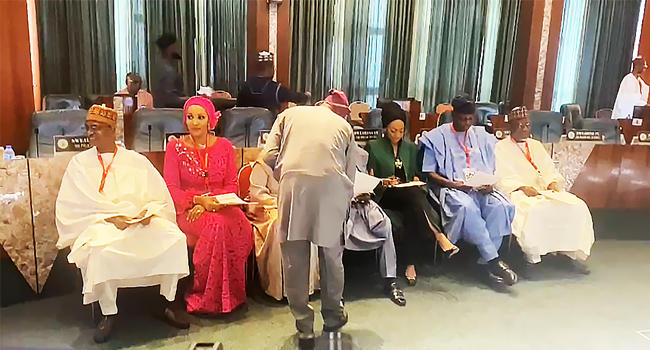On a significant day for Nigerian politics, President Bola Tinubu welcomed seven newly appointed ministers and their families to the Council Chambers in Abuja for their swearing-in ceremony. This event marked the official start of their responsibilities within the government, showcasing the administration’s commitment to address pressing national issues through a refreshed cabinet. All nominees were present alongside other ministers and dignitaries, emphasizing the importance of this occasion. The ceremony took place at the Presidential Villa, but it also necessitated the rescheduling of the usual Federal Executive Council (FEC) meeting, normally held on Mondays, to Wednesday.
Prior to the event, presidential spokesman Bayo Onanuga confirmed the day of the swearing-in on Sunday, underscoring the administration’s timing and organization amid ongoing economic challenges facing the nation. The nominees were confirmed by the Senate after undergoing a thorough screening process. This restructuring follows President Tinubu’s decision to reshape his cabinet—an action indicative of the government’s initiative to respond to the pressing economic landscape of Nigeria. The new ministers have been chosen to lead various sectors considered vital for national development and reform.
The appointed ministers are Dr. Nentawe Yilwatda, now Minister of Humanitarian Affairs and Poverty Reduction; Muhammadu Maigari Dingyadi, who will take charge as Minister of Labour and Employment; Bianca Odinaka Odumegwu-Ojukwu, appointed as Minister of State for Foreign Affairs; Dr. Jumoke Oduwole as Minister of Industry, Trade and Investment; Idi Mukhtar Maiha, who becomes Minister of Livestock Development; Yusuf Abdullahi Ata as Minister of State for Housing and Urban Development; and Dr. Suwaiba Said Ahmad, now Minister of State for Education. Each appointee has been selected for their expertise and potential to spearhead necessary reforms in their respective ministries.
This restructuring of the cabinet follows a series of challenges faced by the original cabinet of 48 ministers appointed in August 2023. These challenges stemmed from the significant economic difficulties affecting Nigeria, raising questions about the effectiveness and functionalities of the initial appointees. In response to increasing scrutiny and public concern over the government’s performance, President Tinubu acted decisively to dismiss five ministers and reassign ten others to different roles within the cabinet.
The necessity for such a reshuffle highlights the critical state of Nigeria’s economy and the government’s recognition of the need for competent leadership in key sectors. By adjusting the cabinet, President Tinubu aims to infuse new energy and innovative approaches to governance. This move suggests a proactive administration eager to address issues such as poverty, unemployment, and education, which are pressing challenges that require effective and knowledgeable leadership.
As the nation looks on, the swearing-in ceremony marks a crucial juncture for President Bola Tinubu’s administration—an opportunity to leverage the skills of the newly appointed ministers to foster stability and growth. The success of these ministers in their respective roles will be scrutinized closely in the coming months, as they assume responsibility for tackling some of the most critical issues facing Nigeria today. Ultimately, this cabinet overhaul is about more than just personnel changes; it represents a strategic response to the call for enhanced governance during a time when the stakes have never been higher for the Nigerian populace.


